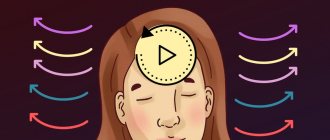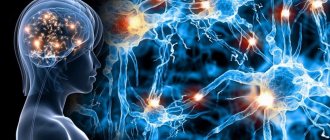Mental states are necessary for a person to successfully carry out various types of activities. In psychology, they are classified on various grounds, the most popular among which is the energy expenditure of the individual. A person’s mental state has a direct impact on the overall functioning of the nervous system, organically fitting into the general construct of personality.
Having a general understanding of the functioning of the psyche and its impact on the performance of a person is necessary in order to be able to manage one’s emotions and maintain the functioning of the nervous system. This knowledge will be relevant both for schoolchildren and students, as well as for adults engaged in intellectual or physical labor in an enterprise.
Definition of mental state
To understand how to formulate a definition of a mental state, you need to turn to the study of the biological and psychophysiological principles of the nervous system.
In psychology, the features of mental life are considered a category of the general methodology of science, which determines the features of the activity of a particular individual. The variety of phenomena in the emotional sphere as an object of scientific research was first discovered in the works of N.D. Levitova.
In theoretical articles, the author defined the state of a person’s mental sphere as a peculiar feature of the psyche, reflecting the work of the nervous system, supporting his judgments with empirical results. At the same time, the researcher draws the reader’s attention to the fact that conclusions about the current emotional status of an individual at the time of his study must be made based on events that happened to him recently. At the same time, the scientist does not deny that tragic events of the past can make themselves felt many years later, when a person, it would seem, no longer remembers them. It follows that signs of a mental state increase or decrease the efficiency of the body.
The psychological state is the basis for mastering the norms and rules of behavior of an individual in society. They occupy an intermediate position between personality traits and processes such as voluntary attention, short-term and long-term memory, logical thinking, imagination, and speech. In labor psychology, this phenomenon is taken into account when preparing a personnel reserve for representatives of different professions.
Examples of mental states are moods, feelings and emotions, as well as sleep and wakefulness. The stages of development of mental states are determined by the predominance of processes of inhibition or excitation in the nervous system.
List of all emotions (most common)
Among all known human emotions, the most powerful are the emotions from the list below:
- Anger. Has anyone ever told you not to do what you want? How are you feeling? Is your blood starting to boil, is your temperature rising? This is usually how anger is described. Your body reacts to something that is not happening your way, and this is an attempt to correct the situation;
- Sadness. If you miss a deadline, get a bad grade, or don't complete work, you'll probably feel upset. Sadness happens when we are unhappy with ourselves, our accomplishments, or the behavior of someone else around us. Sadness can be a healthy experience because it indicates that we are passionate about something. It can be a great catalyst for achieving change;
- Joy is a feeling of delight, happiness, and perhaps even euphoria, often experienced as a sudden surge due to something good;
- Hope is a feeling of optimism and anticipation of a positive future;
- Pride is a feeling of self-approval and pleasure in an achievement or skill.
To prevent your emotional state from harming you and your environment, you need to learn to control your feelings and emotions. Despite the fact that emotions arise on their own, it is quite possible to curb them. In any current situation, you need to look at the circumstances soberly in order to prevent bad consequences.
Categorization criteria
It is customary to divide psychological experiences into independent categories according to such basic characteristics as:
- the source of their occurrence (they are born internally under the influence of a person’s thoughts or are formed as a result of the influence of external factors);
- degree of awareness (formed in the unconscious layer, in the preconscious or in the conscious layer of the psyche);
- duration (short-term, medium-term or long-term);
- degree of severity (barely noticeable, medium severity, pronounced);
- emotional background (positive or negative);
- area of manifestation (behavior, work activity, mood, will, motivation).
Types of mental states
Depending on the leading processes in the psyche, emotional, gnostic (cognitive) and volitional psychological states of a person are distinguished. Examples of emotional varieties are love passion and sexual desire, immediate joy and good spirits, sadness and doom, depression and depression, melancholy and despair, grief, indignation and resentment, panic, anger and affect.
The essence of gnostic experiences is conveyed by such short-term emotions as cognitive interest, curiosity, concentration and absorption in work, puzzlement and bewilderment, surprise, doubt and skepticism, daydreaming and a tendency to fantasize. All the emotions listed here are inextricably linked with the process of activity and do not exist in isolation from it.
The strong-willed varieties include: activity and initiative, determination and purposefulness, confidence, calmness and self-control, restraint and diametrically opposed characteristics paired with them. Unlike the previous group, these personality characteristics do not arise on their own; they are formed in the process of upbringing in childhood and adolescence.
The system-vector direction of psychology is based on a similar classification. In this approach, emotional phenomena of the psyche are represented by such groups as tension and relaxation in activity and motivation, feelings of pleasure and displeasure in the process of cognition or experience, activity and passivity as permanent personality types.
It must be said that supporters of this approach to classification emphasize that not everything can be corrected. Some experiences are determined by the type of nervous system and its mobility, which cannot be changed. Therefore, the passivity and slowness of some people, as well as the excessive activity of certain individuals, sometimes need to be taken for granted and a person must be taught to live with these individual typological characteristics.
According to the criterion of connection with the structural components of personality, it is customary in psychology to distinguish such types of mental phenomena as personal experiences that are related to activity, emotions of individuality.
What are the different types of mental states that influence a person? Stenic varieties - they stimulate the activity of the individual; asthenic types - they inhibit the activity of the individual.
What would be a simplified classification of mental states?
Moral and psychological
This type is born as a result of the individual’s personal (subjective) experiences when contemplating the surrounding reality. The degree of correspondence between the phenomenon seen and the emotional experience that appears characterizes the level of adequacy of the individual’s response. The structure and types of moral experiences are determined by the characteristics of a person’s nervous system and the type of his temperament, as well as characterological characteristics.
Emotional-psychological
The definition of this group is based on the psychological characteristics of the individual and the emotions of a person that arise in a particular life situation. The types of this group are affects, passion, a person’s mood, his experience of stress or discomfort from frustration. Mood reflects the state of a person engaged in one or another type of research, practical, labor, or creative activity. The predominance of positive or negative connotations of emotional and mental states is also determined by the type of personality temperament. The mental state of an energetic choleric person is characterized by rapidly changing brightly colored experiences (outbursts), while the main characteristic of the emotional background of a slow-moving phlegmatic person will be calmness and the absence of bright outbursts and causeless changes in mood. Negative mental states predominate among melancholic people prone to depression, while positive mental states prevail among carefree, cheerful sanguine people.
Stress and the mental state of frustration are those types of emotional states that require immediate elimination. Sometimes a person cannot cope with them on his own; he needs the help of a qualified psychologist or psychotherapist. In some cases, to correct an individual’s well-being, he requires drug therapy and observation by a psychiatrist.
Psychological states of a person
The psychological block of personality includes all components of the human psyche: characteristics of the nervous system, worldview, value orientations, motivational-need block. The concept of an individual's attitudes and beliefs in the formation of mental states is of paramount importance.
Psychological state of the child
The structure and types of mental states of a child are explained by the age-related characteristics of his development. The possibility of an objective assessment of the psychological status of children does not appear until they reach 15–16 years of age. Until this time, children are characterized by momentary changes in mood and a superficial perception of what is happening.
The characteristics of the child’s mental processes and emotional states depend on the home environment and psychological climate in the family.
Socio-psychological
What refers to the socio-psychological states of the individual? First of all, these are all social contacts of a person. The emotional orientation of a person is determined by the level of development of a person’s communication skills, his self-esteem, and image.
A person’s negative assessment of his mental state during interactions with others can lead to the development of psychosomatic diseases.
Z
Caring is a person’s activity of voluntarily contributing to the good of another: providing help and support, creating favorable living conditions, giving warmth and love, participation in life situations, etc.
Envy is a feeling of annoyance or bitterness that arises at the sight that another has a benefit or advantage that the envious person does not have, and is accompanied by a desire to deprive the rival of them.
Confusion - embarrassment, bewilderment, anxiety and confusion from bewilderment.
Withdrawal is a person’s desire to avoid communication, withdraw from interaction, and isolate themselves.
Arrogance is pride, a tendency to forget easily, to put oneself above others, to exaggerate one’s own qualities and to underestimate those of others. It may be a consequence of success or well-being, or any advantages over communication partners.
Shyness is a complex condition that is characterized by a distorted perception of the nature of human relationships, embarrassment as a short-term loss of self-esteem, an increased tendency to introspection and self-esteem, a focus on bodily symptoms, negatively colored egocentrism, a sense of personal insecurity, a desire to attract attention and at the same time remain unnoticed. Shyness can be caused by a hereditary personality trait, the lack of certain social skills necessary for effective communication; deep unconscious conflict, etc.
Schadenfreude is an individual’s joy in connection with someone else’s grief, with the shortcomings of others and the troubles of another. It can be combined with envy, hostility, contempt, but also with a positive emotional perception of the object, including a friend or beloved relative. It can be combined with a sense of justice - in case of satisfaction with punishment, the misfortune of another due to incorrect behavior. It may be a consequence of resentment, envy, jealousy, hatred, and is associated with an inferiority complex. Schadenfreude can be mixed with a satisfied sense of justice.
Properties
All mental states have special properties:
- Integrity is the interconnection and interdependence of all components of the psyche. This property influences the efficiency of human activity.
- Sustainability. All types of human mental states are more permanent than momentary emotions.
- Mobility is the property of mental states to change their functions following a change in the situation.
- Polarity – this property expresses the pairing of emotional experiences. For every positive experience, you can select a diametrically opposite (negative) emotional experience.
Levels
The essence and classification of mental states in psychology are manifested at different levels:
- the physiological level reveals the neurophysiological, biological and morphological features of a person’s response to what is happening;
- psychophysiological level, which determines the sensory and vegetative reactions of the body;
- socio-psychological level, taking into account a person’s status in interpersonal relationships, his attitude to work;
- psychological level that sets the general emotional mood of the individual.
Forming factors
What factors influence a person’s psychological state? It is generally accepted that the factors of a person’s mental states include: general personality tone, motivation, mood, expectation of success, subjective attitude to activity. Based on these components, the factors received names such as:
- Motivational and incentive is the most powerful factor that stimulates the activity of an individual. The leading components here are a person’s satisfaction with his relationship with his loved one and financial security.
- Emotional-evaluative is a factor indicating a person’s attitude towards a particular type of activity and the result of his work.
- Activation-energy is a factor that characterizes a person’s physiological activity and manifests itself in the natural change of sleep and wakefulness. Human health is also considered an active energy factor. Strong experiences are usually associated with excitement, and weak ones with inhibition in the nervous system.
Affects
Affect is an emotional process of an explosive nature, characterized by short duration and high intensity. Accompanied by pronounced motor manifestations and changes in the functioning of internal organs.
| Anger | Negatively colored affect. Extreme degree of indignation |
| Hostility (Hateness) | Complex of affects: Anger + Resentment + Disgust |
| Confusion (affect of bewilderment) | An acute psychopathological condition that combines emotional (intense anxiety) and cognitive (acute sense of not understanding what is happening) components |
| Fear | |
| Numbness | State of stupor or immobility |
| Joy | |
| Delight (Euphoria) | A positive affect or emotion. Feels like a very powerful, sudden, all-filling feeling of happiness, delight |
| Revival | Active movement, noticeable manifestations of any activity |
Functions of mental states
Mental states are a structural component of the psyche. The list of functions they perform looks like this:
- formation of personal self-esteem;
- discussion of a person to perform certain actions;
- predicting the success of certain undertakings;
- forcing a person to complete the work he has begun;
- formation of a person’s attitude to activity;
- evaluating the results of your work;
These 6 functions are explained by the essence and classification of mental states.
Diagnostics
Some people have the unique ability to accurately assess their mental state. Physical well-being is the main “barometer” for them. Other people need the help of a psychologist in this matter.
In psychology, determining a person’s mental state is an analysis of his psychophysiological and psychological levels. The study of the psychophysiological level allows us to study the nature of the emerging feeling and determine (if necessary) ways to correct it.
The most popular diagnostic tools are psychological tests. With their help, the mood, well-being and level of activity of an individual are diagnosed. The most indicative results are obtained by such methods as the Luscher color test, SAN, PAT, “Nervous-Mental Tension Questionnaire,” “Relief of Emotions,” and personal anxiety tests.
In medicine, methods for diagnosing mental conditions include ECG and GSR results, heart rate, and brain encephalogram.
ACQUISITION OF ST. SPIRIT
The most frequently mentioned and described in detail form of the infusion of God in the patristic works is the acquisition of the Holy Spirit
:
- “Truly, there is only one seal of Christ - the illumination of the Holy Spirit, although there are many types of His influences and many signs of His power” (Christ.: Simeon the New Theologian. Vol. 1, 1993, p. 36);
– “The mind of the temperate is the Temple of the Holy Spirit; and the mind of a glutton is the dwelling of corvids” (Christ.: Thalassius Abba. 1900, p. 306);
“It is impossible to receive the All-Holy Spirit otherwise, unless someone, having withdrawn from everything that is in this age, devotes himself to seeking the love of Christ, so that the mind, freed from all worries about material things, is directed towards this only one goal, and thus is worthy to be in one Spirit with Christ...” (Christ.: Macarius of Egypt. 1998, p. 434);
– “Some of the brethren think that they cannot have the gifts of the Holy Spirit: for, due to negligence in keeping the commandments, they do not know that he who has true faith in Christ has in himself in short all the gifts of God. But since we, due to our idleness, are far from active love for Him, which would show us the Divine treasures within us, we rightly consider ourselves alien to the gifts of God” (Christ.: Maximus the Confessor. Four hundred chapters on love. 1900, p. 223);
– “Pray to the most good God, that He will send you the Holy Spirit of the Comforter, and He, having come, will teach you everything and reveal to you all the sacraments. Look for it in your guide; He will not allow delusion or dissipation in the heart, he will not allow negligence and despondency, or slumber in thought; will enlighten the eyes, strengthen the heart, elevate the mind” (Christ.: Barsanuphius the Great, John. 1995, p. 96);
- “When the soul calms down from the constant torment of passionate thoughts and the painful burning of the flesh fades, then know that the influx of the Holy Spirit has taken place within us, announcing the remission of past sins and the granting of dispassion to us” (Christian: Nikita Stifat. Active chapters first centenary 1900, p.97).
– “The betrothal of the Holy Spirit is inexplicable even for the one who acquired it, since it is comprehended incomprehensibly, held uncontrollably, seen invisibly; lives, speaks and moves the one who acquired it: it flies away from the mystery in which it remains sealed, and is again found there unexpectedly, which forms the conviction that just as its presence does not make it confirmed once and for all, so its departure is irrevocable, after which wouldn't come back. Thus, he who has acquired it, and when he does not have it (tangibly present), is as if he had it, and when he has it, he is in such a position as if he did not have it” (Christ.: Simeon the New Theologian. Creations. Vol. 2 1993, p.536).
In addition, St. the fathers describe various ways or forms of the Holy Spirit indwelling a person:
– Barsanuphius the Great was asked: “Can anyone say that the Holy Spirit lives in a sinner? And if he says that he does not have it in himself, then how, my Father, are sinners preserved?” He answered: “The saints are worthy to have the Holy Spirit within themselves and become His temple... Sinners are alien to this... They are preserved by His grace. So, in everything, let us give thanks to His ineffable goodness and love for mankind” (Christ.: Barsanuphius the Great, John. 1995, p. 280);
- according to Maximus the Confessor, the Holy Spirit dwells in everyone, although in different ways: “The Holy Spirit is in everyone in general, as it embraces everyone and provides for everyone, and sets in motion the natural seeds (of good) in everyone. But in those who are under the law, He is definitely there, as an indicator of the transgression of the commandments and an illuminator of the promise predicted regarding Christ. In all those who are according to Christ, besides what has been said, and as the bearer of sons, or the producer of adoptions” (Christ.: Maximus the Confessor. Four hundred chapters on love. 1900, p. 260); but, at the same time, “as the giver of wisdom, in none of the said persons, He is simply and unconditionally, but only in those who, understanding the matter, have made themselves worthy of His Divine infusion by their God-like life” (ibid.);
- and according to Basil the Great: “The Holy Spirit abides in everyone, but reveals His own power in those who are pure from passions, and not in those whose sovereignty of the soul is darkened by sinful impurities” (Christ.: Basil the Great. 2002, p. 5-6).
Macarius of Egypt explains the possibility of the presence of the Holy Spirit even in a sinner as follows: “The sun is a body and a creature, but, sanctifying stinking places, where there is mud and uncleanness, it does not suffer in the least, or is not defiled: how much more is the pure and Holy Spirit, abiding in the soul, which is still under the influence of the evil one, does not borrow anything from it, for the light shines in the darkness, and its darkness is not enveloped
(John 1:5)" (Christ.: Macarius of Egypt. 1998, p. 141).
Analyzing states of grace in their integrity and interconnectedness, we can identify the following pattern: as we move from sobriety and repentance to communion with God and acquisition of the Holy Spirit, an increase in the degree of intensity and coordination, integrity and harmony of these states is observed. In addition, in this case there is a decrease in the actual mental component in the states and an increase in the spiritual one. So, it is difficult to judge higher states from the point of view of lower states - the “ineffability”, the inexpressibility of the spiritual experience of a Christian ascetic is connected with this.
Problems of psychological states
What are the problems in studying psychological states? First of all, this is the difficulty of separating the subjective and objective factors that give rise to this or that emotional experience.
The predominance of negative psychological experiences leads to a feeling of dissatisfaction with one’s life. Awareness of problems in psychological terms and the ability to analyze one’s own state are not the methods by which a person can cope with psychosomatics. To restore performance, normalize sleep and get rid of causeless headaches, a person needs to consult a psychologist. Only a qualified specialist will be able to correctly determine the cause of the problem and choose effective methods to eliminate it.
Human emotional background
This component helps determine whether a person has the strength to fight, whether he will make efforts to cope with melancholy, internal discomfort, despair and fear. For many people in a state of mental crisis, fears prevent them from remaining themselves.
The emotional background is a reserve from which inspiration, joy, and confidence in the future are drawn in difficult moments. Without such a resource, it is impossible to move forward in life and hope for the best. When faced with challenges, it is necessary to clearly understand what decision to make and what consequences this will have in the future. With the help of accumulated emotions, a person discovers the strength to achieve, or renounces claims.
My recommendations
Clients often come to me with complaints of chronic fatigue, loss of appetite, and lack of desire to do anything. They do not understand what is happening to them, they report that they have been to many doctors, have undergone a bunch of tests, but the cause of the decrease in performance and apathy has not been established. "What happened with me?" - they ask me. My answer that these symptoms relate to anomalies in the mental state of the individual usually surprises them. However, my initial assumptions are confirmed by the results of psychological tests. At the next stage of working with the client, I tell him about what types of mental states are distinguished in modern psychology, since often, having familiarized themselves with the diagnostic results, they say: “Indicate what refers to the mental states of the individual.”
In most cases, 5-10 sessions with a psychologist are enough to correct the psychological state that occurs when you are in a low mood. I give recommendations on developing reflection skills and teach relaxation techniques. The main method in my work is art therapy. In my opinion, this method is the key to the inner world of the individual. Through art therapeutic exercises, a person finds harmony with himself and learns to manage his emotional field.
HUMILITY
Humility
is the main criterion by which the positive spiritual and moral essence of a person is recognized (Christ.: Mikhail (Trukhanov). 1997, p. 160). Humility may not always be noticeable outwardly, but internally it is simply irreplaceable: “What salt is to every food, so is humility to every virtue; it can crush the strength of many sins” (Christ.: Isaac the Syrian. 1993, p. 199).
Humility is the most basic property of the New Man: “learn from Me, for I am meek and lowly in heart...” (Matthew 11:29). Without humility, “fulfilling even all the commandments not only does not bring a person closer to God, but even makes him an enemy of God, because if there is no humility, then there will certainly be pride” (Christ.: Nikon (Vorobiev). 1988, p. 9) .
“Humility is always beautiful, It frees people from all painful worries. Its fruits are abundant and desirable. From him is born simplicity of heart, with which Noah pleased God and received salvation...” (James St. 1827, p. 264); “The humble are the sons of the Most High and the brothers of Christ” (ibid., p. 270).
Humility is the main condition for human salvation: “Many received salvation without prophecies and lights, without signs and wonders; but without humility no one will enter the heavenly palace” (Christ.: John Climacus. 2001, p. 177). And therefore, a Christian should create in himself such a humble mood in which it would always be possible and natural for him to pray the publican: “God! be merciful to me, a sinner! (Luke 18:13).











